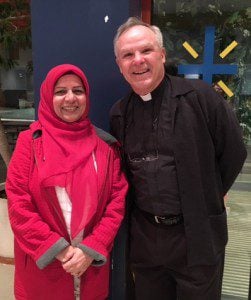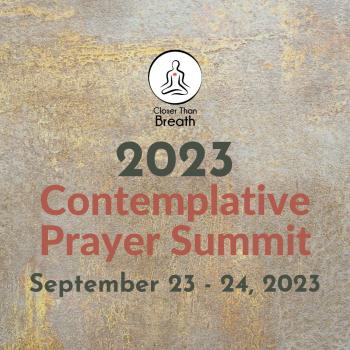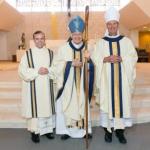 The other night a Muslim woman spoke at my church. Her name is Moina Shaiq, originally from Pakistan, now living in the Bay Area of California. She has a ministry called, simply enough, Meet a Muslim. A mother and grandmother, she has lived in America now almost 40 years.
The other night a Muslim woman spoke at my church. Her name is Moina Shaiq, originally from Pakistan, now living in the Bay Area of California. She has a ministry called, simply enough, Meet a Muslim. A mother and grandmother, she has lived in America now almost 40 years.
Through “Meet a Muslim” she offers to connect with people of other faiths for dialogue and conversation. She had spoken at the Disciples of Christ Church across the street from our parish, and the minister there recommended her to our parochial vicar, and so she came to visit us.
About 150 parishioners, students, and other interested folks showed up. The evening began with our pastor, Fr. Mark, reading the paragraph from the Vatican II document Nostra Aetate about the positive esteem that Catholics have for Muslims. Then he introduced Moina, who spoke briefly about herself, why she launched this effort (in the wake of the San Bernardino shootings last year), and a basic overview of Islam, before opening the floor up for questions.
Most people seemed genuinely interested in learning more. Several thanked her for her courage to come to a Catholic Church to talk about her faith. Some of the questions were pointed, especially as people wondered about issues such as the status of women in Islam or the relationship between faith and politics in Muslim majority nations, but generally the tone was civil and focussed on simply hearing what this Muslim woman had to say.
Generally, but not entirely. One belligerent man loudly insisted that Muslims were taught to lie in order to propagate their faith. To back up his allegation, he invoked the concept of taqiya — an Arabic word that literally means “prudence,” and that refers to the permissibility of denying one’s faith or beliefs in order to avoid persecution. It’s a defensive concept — but it has been misinterpreted by extremist critics of Islam to imply that Muslims will do, or say, anything to advance the cause of their religion.
“So why should I believe you?” he practically shouted.
Here’s what this implies: “Muslims are committed to violently overthrowing Christianity. Of course, if Muslims are up-front about this, Christians will unite against them. Therefore, Muslims pretend to want peace and harmony, which will lull foolish Christians into accepting them, but then as soon as they have a majority of the population, down comes the boom and Christians become the persecuted minority.”
In other words, taqiya has become a code-word among people suspicious of Islam, to mean “Muslims can never be trusted.”
But to think that taqiya proves Muslims cannot be trusted is not only bad scholarship (it’s simply historically untrue) — but it’s also evidence of a dualistic mindset, which impugns all Muslims as “the enemy.” It’s a form of scapegoating, and we’ve seen this before in America: believing that an entire group of people cannot be trusted has been used in the past to target Native Americans, African-Americans, communists, and… well, Catholics. But nowadays, Muslims (and, by extension, refugees from Muslim countries) are often the target of this kind of scapegoating.
As Moina Shaiq tried to patiently explain that Islam, like every other religion, is based on human civility and decency and that any Muslim child knows that lying is wrong, the man just kept trying to talk over her. When another person in the audience — a woman who teaches World Religions at a local Catholic High School — came to the speaker’s defense, pointing out that taqiyya means prudence and not duplicity, the man just began arguing with her instead.
Finally, our pastor had to intervene and ask everyone to cool down.
Throughout this exchange, Moina Shaiq maintained poise and dignity, and never took the bait to become argumentative or defensive in response to the man’s attack. Any reasonable person watching the exchange would have been impressed by her demeanor, and a bit embarrassed by the man’s bluster and obvious suspicion.
I understand that some Americans (including some American Catholics) have misgivings about the spread of Islam in America; it’s human nature to be uncomfortable with change and with cultural differences. Because terrorism related to Islamic extremism gets plenty of media airtime in our nation, it’s unfortunately too easy to have a distorted view of Islam.

But as Moina Shaiq pointed out, “Just as the Ku Klux Klan does not represent the true teachings of Christianity, likewise ISIL does not represent the true teachings of Islam.” Therefore, I think even those who might have some misgivings, have an obligation to develop a balanced and unbiased view of Islam, and look for creating a society where people of different faiths can coexist peacefully.
Whether we like it or not, the world is now a global village, and none of the major faiths are going away. We have two choices. We can view other faiths through the lens of suspicion, seeing them as “the enemy.” The belligerent man, sadly, appears to have made that choice. But our other option is to take the path that Moina Shaiq has taken: to reach out to one another, to try to foster dialogue and conversation and to look for positive ways to create a truly multi-cultural society, which is what we’ve got anyways, so now we need to learn to embrace it positively.
Jesus insists that one of our key mandates, as his followers, is to love our neighbors. In the Sermon on the Mount, Jesus also very bluntly told us to “love our enemies.” For Catholics, this is not optional. Failure to do this is a sin. G. K. Chesterton once joked that we were told to love our neighbors and to love our enemies because very often they are the same people. That may be true enough. But I think we also have to beware of the sinful human tendency to be so suspicious of our neighbors that we turn them into “enemies,” if only in our own mind.
When we remember to love our enemies, we have taken the first step to reconciling with them; transforming them from enemies to friends. And when we remember to love our neighbors, we can, with God’s help, safeguard against making them enemies to begin with.
Enjoy reading this blog?
Click here to become a patron.
Stay in touch! Connect with Carl McColman on Facebook:














